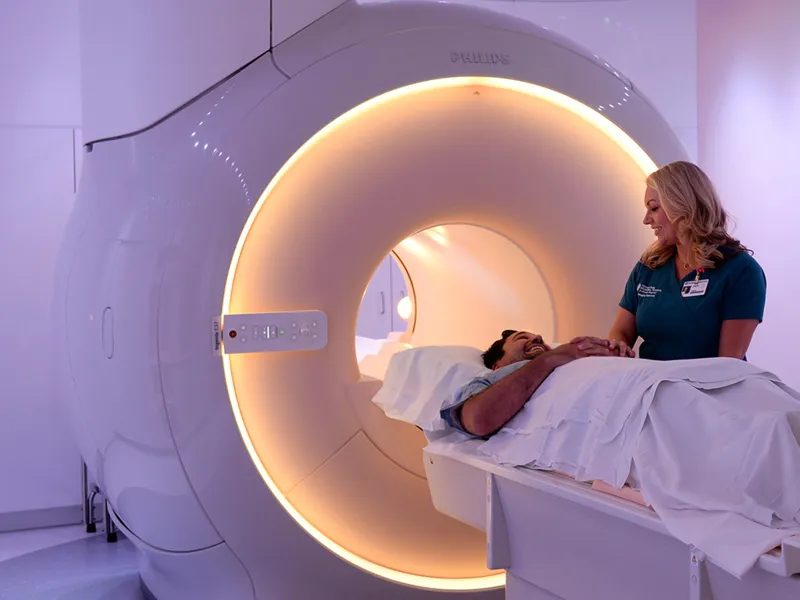
When You Have Health Questions Advanced Imaging Technology Gives You Answers
Today’s sophisticated imaging technology allows physicians to identify health problems, evaluate injuries and conditions, and make educated decisions and recommendations about your care. At AdventHealth Ottawa, you have access to the latest imaging techniques — and a skilled, caring team that puts your comfort and safety first.
We’re here to help you find the right physician or a location that’s convenient for you.
Our Full Range of Imaging Services
- General Radiology
-
X-rays are the oldest form of medical imaging and are still widely used — but today’s X-rays are digital and more detailed than ever before. X-rays use electromagnetic rays to create images of bones and other structures inside your body. The images are used to check for injuries, such as broken bones, or conditions and illnesses, such as pneumonia.
- Bone Densitometry
-
Used to detect bone loss from osteoporosis, bone densitometry can help you and your doctor take steps to stop the loss and prevent fractures. It can also be used to confirm that treatment is working. Bone density tests are recommended for women aged 65 and older, and sometimes for men and women of all ages with certain risk factors. The test is painless and uses low-dose X-rays.
- Computed Tomography (CT)
-
CT scans combine X-ray and computer technology to create cross-sectional images of the body. A series of X-ray pictures, each a thin slice, are put together to form a three-dimensional view of internal structures. Some CT scans require dye to be injected into your vein to help physicians see certain tissues.
CT scans have a wide range of uses for detecting or evaluating injuries or conditions throughout the body, and our team is skilled in its use. The procedure is painless, and usually takes about 30 minutes, depending on the area of the body being scanned.
- Magnetic Resonance Imaging (MRI)
-
An MRI produces precise two- or three-dimensional images of the inside of the body by using a large magnet, radio waves and a computer — and some dye required to be injected into your vein to help physicians see certain tissues. As you relax on a table, the table slides under a scanner that creates a series of images.
The images are combined to produce a detailed picture of structures within your body. MRI is used to detect and evaluate a wide range of injuries and conditions, from torn ligaments to brain tumors. Our MRI specialists can help you stay comfortable and at ease throughout the entire process.
- Nuclear medicine
-
Using small, safe amounts of radioactive material, nuclear medicine scans create images of specific organs. The material used depends on which organ is being scanned — for instance, iodine is picked up by the thyroid gland. The radioactivity given off can be picked up by a special camera and stored in a computer for evaluation by our team. By using different materials, our team can scan almost any organ in the body and see how it’s functioning.
- Mammography
-
A mammogram is special X-ray of the breast that’s used to check for breast cancer. Regular mammograms can detect tumors before they can be felt during an exam, when they‘re easier to treat. That’s one reason breast cancer now has a five-year survival rate of more than 90%. If you’re a woman age 40 or older — or if you have a family history of breast cancer — talk to your doctor about how often to have regular screening mammograms.
When you have a mammogram, you stand in front of an X-ray machine as your breast is pressed between two plastic plates while X-rays are taken. Our technicians are skilled in getting high-quality images while keeping you as comfortable as possible.
- Ultrasound
-
Ultrasound uses high-frequency sound waves to look at structures inside the body. It’s used to view organs, such as the heart, blood vessels and kidneys, and during pregnancy to view the fetus. It can also be used during needle biopsies and other procedures to view the area or structure being tested. You can’t feel the sound waves — all you feel is the technician or physician moving a device called a transducer over your skin.
Skilled Radiologists, Advanced Technology Imaging Services You Can Rely On
Our team of skilled radiologists works with the area’s most advanced medical imaging technologies for faster diagnosis and treatment.
